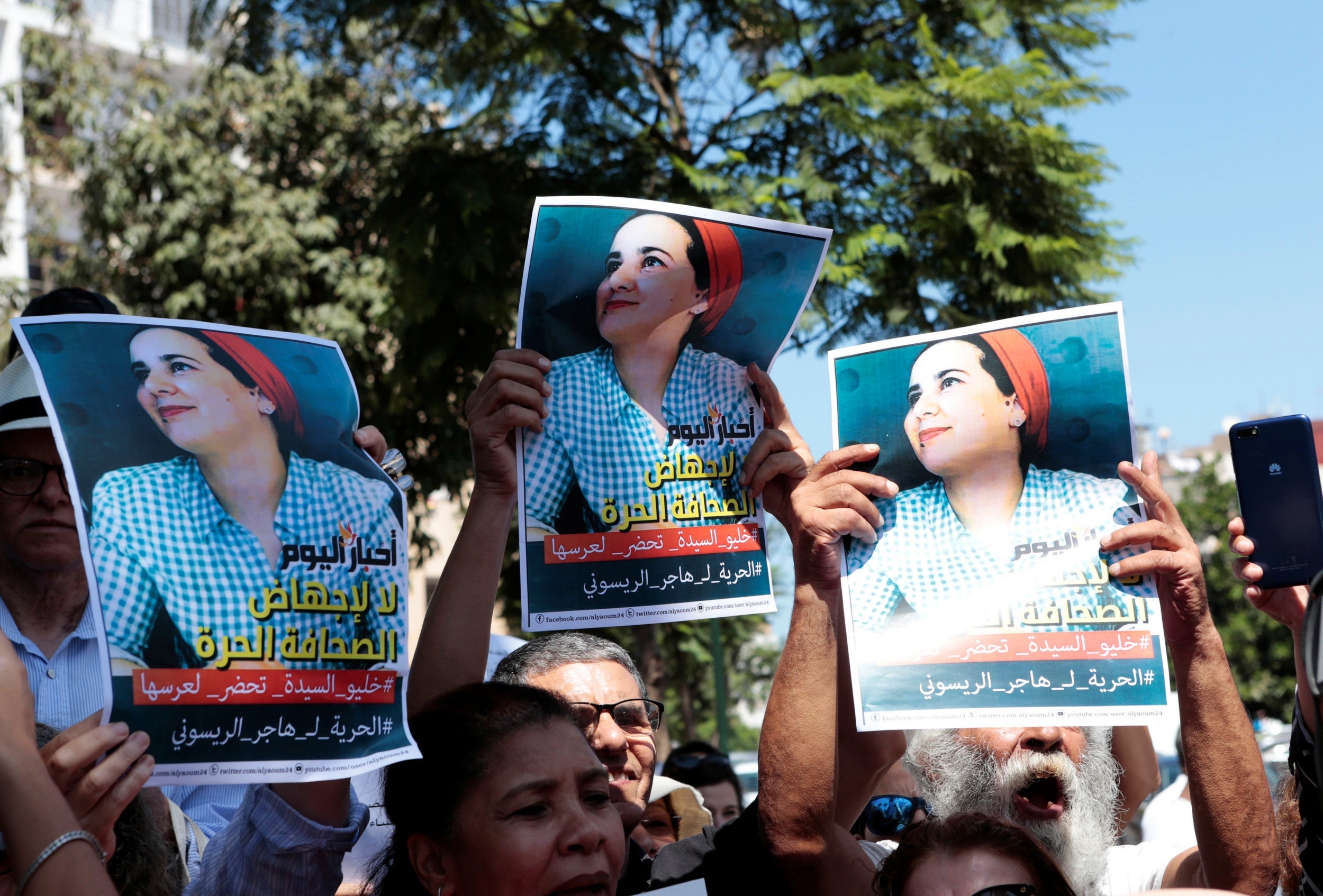Imprisonment of journalist over alleged abortion and sex outside of marriage 'flagrant violation of rights'
She faces up to two years in prison if convicted

The Moroccan authorities’ imprisonment of a journalist over having an abortion and sex outside of marriage “flagrantly violate” her rights, Human Rights Watch has warned.
The organisation called for the authorities to drop the charges and release her immediately, arguing that her right to privacy and liberty had been violated.
Police in capital of Rabat arrested Hajar Raissouni on 31 August and allegedly interrogated her about her private life.
A prosecutor charged the 28-year-old Moroccan journalist with having an abortion and sex outside marriage two days later. She faces up to two years in prison if convicted.
Hundreds of people protested outside the court in Rabat on Monday with demonstrators shouting: “Freedom for Hajar!” and “Our society is in danger!”
Several also carried placards saying: “No to the criminalisation of sex between consenting adults” and “My body, my freedom”.
“Hajar Raissouni is being charged for alleged private behaviour that shouldn’t be criminalised in the first place,” Ahmed Benchemsi, Middle East and North Africa communications director at Human Rights Watch, said. “Moreover, by publicising detailed allegations about her sexual and reproductive life, authorities trampled on her right to privacy and apparently sought to smear her reputation.”
He added that the arrest illustrates the country's "lack of respect of individual freedoms" and selective use of the law.
The case brought against Ms Raissouni has sparked a ferocious debate in the press and on social media about civil liberties and media freedom, with some fearing that the arrest may have been politically motivated.
Ms Raissouni writes for the Arabic-language newspaper Akhbar Al-Yaoum – a publication which has a record of disputes with the authorities and is one of the north African country's few remaining critical newspapers. She is also from a famous dissident family.
In a letter from prison, published by Al Yaoum 24, a website associated with the newspaper, Ms Raissouni alleges the police were asking her several questions about her work as a journalist and her relatives.
She also said police interrogators asked specific questions about her relations with her fiance that led her to believe the couple had been under surveillance.
Ms Raissouni, who is religiously but not yet legally married, had been due to tie the knot with her partner Rifaat al-Amin this week.
Six policemen in civilian clothes arrested the couple last month near an obstetrics-gynecology office, where Ms Raissouni was a registered patient.
Saad Sahli, a lawyer for the pair, told Human Rights Watch the police took them to the office, where they also arrested a doctor and two aides, and then transported the five to a police station in Rabat to be interrogated.
The doctor and his aides are charged with carrying out an abortion and complicity in abortion, and face up to a decade in prison.
Morocco's penal code bans sex before marriage and abortion unless the mother’s life is in danger. Courts last year tried more than 14,500 people for “debauchery”, 3,048 for adultery, 170 for homosexuality, and 73 for having abortions, according to official figures.
The police took Ms Raissouni later that day to Rabat’s Ibn Sina hospital, where staff subjected her to a gynecological examination without her consent, one of her lawyers, Mohamed Sadkou, told Human Rights Watch.
The organisation argued such examinations, when performed without the person’s consent, constitute “cruel and degrading treatment” under international human rights standards.
Last week, a prosecutor in Rabat released a statement that was widely distributed to the media describing the allegations against Ms Raissouni. It included deeply personal details relating to her sexual and reproductive health and violated her right to privacy.
The statement said her arrest was “not connected in any way” to her being a journalist, and happened “incidentally” after she visited a medical office, adding that the clinic was now under surveillance following reports that abortions were being routinely conducted there.
Her trial has since been postponed until 16 September.
Join our commenting forum
Join thought-provoking conversations, follow other Independent readers and see their replies
Comments
Bookmark popover
Removed from bookmarks